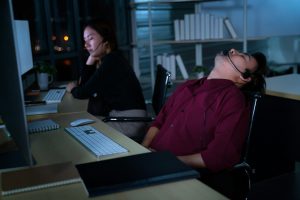Individuals that have a regularly disrupted 24-hour cycle are more likely to experience mental health issues such as mood disorders.
The disrupted routine can contribute to increased feelings of loneliness and lower happiness levels according to new research. Despite the study not explicitly outlining whether the problems are a result of disruptions to circadian rhythms, are caused by them or a combination of the two, it does show the importance of a balanced lifestyle.
Lead author of the study Daniel Smith of the University of Glasgow said that the question of designing “cities or jobs to protect people’s mental health” could become an issue in the future as “people have these 24-hour patterns of living”.
The study took data about the participant’s activity levels during their most active 10 hours each day and their least active 5 hours of every day. The researchers said that this showed “the inconsistency or the disruption in the regularity of the routine of rest and activity.”
Essentially, those who were active during the day and inactive at night, i.e. sleeping, would score high amplitude whilst those who seemed to be regularly disturbed at night and relatively inactive during the day received a low score.
These scores were then compared to the questionnaire participants had answered prior to the study. Questions included in the pre-test include those relating to loneliness, reactions times as well as more pressing questions asking about feelings related to depression or bipolar disorder.
Ultimately it showed that once factors such as age, sex, time of year and previous health had been accounted for, those with lower amplitude tended to have poorer mental health.
Researchers admitted that the study was limited and couldn’t be used as a general consensus for everyone however did say that it was still noteworthy. There have been numerous other studies that have linked mental health and activity and rest levels in the past that have all concluded a similar thing.
Professor Smith advised that people stop participating in activities that are likely to keep them awake after 10pm in order to limit disruptions to the circadian rhythm. This includes things like mobile phones and making food or drink.
Nancy Cole has over 15 years experience as a educator and health practitioner. She has a B.S. from Brock, and a Ph.D. in biology from the University of Guelph . Nancy has worked as a special medical consultant for a major insurance provider before becoming a freelance health author and public speaker.





